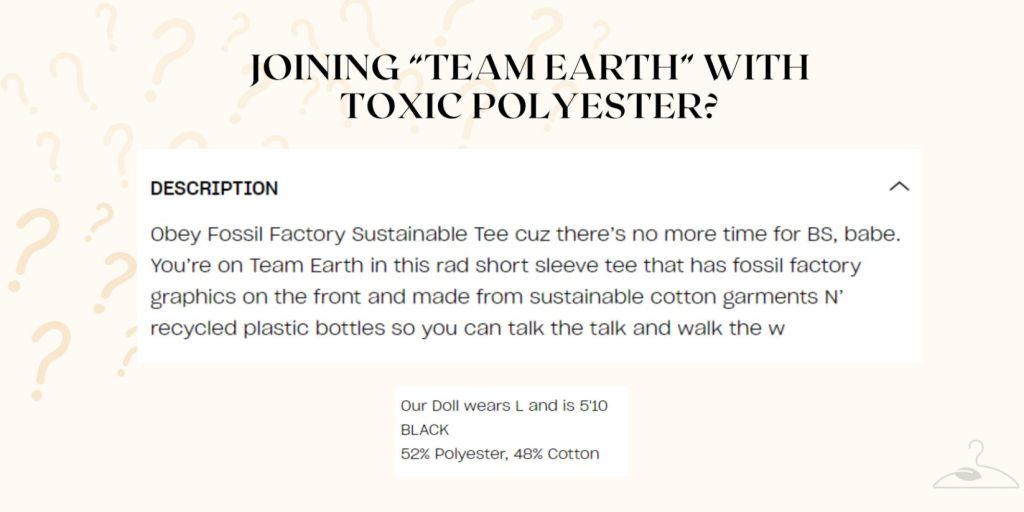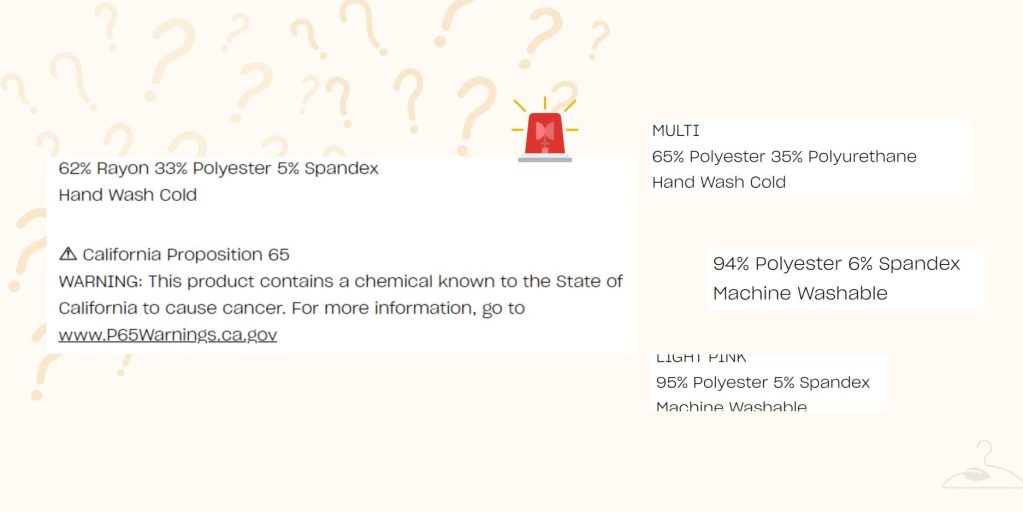Is Dolls Kills fast fashion or is it ethical? That’s the question many consumers are asking about the LA-based fashion brand, known for its bold, unconventional styles. With a strong following among ‘e-girls’ on TikTok, Dolls Kills is a brand we recommend avoiding. Here’s why.
Is Dolls Kill Fast Fashion?
Dolls Kill refuses to disclose information on its labor practices. However, based on its design theft accusations, overproduction, and greenwashing practices alone, it is evident that the brand qualifies as fast fashion.

Greenwashing: “Sustainable” Tees from Dolls Kill
On the Dolls Kill website, you’ll find a lot of items labeled as “sustainable,” which is ironic coming from a brand that overproduces to such an extent. For instance, an asymmetric bodysuit listed on the website, allegedly made with “recycled materials”, comprises of 86% recycled fabric only. The rest? virgin spandex – one of the most toxic clothing materials available on the market.
This example shows that the brand is greenwashing – Dolls Kill pins a sustainability badge on a product that barely meets the definition. And the greenwashing continues. When inspecting the fine print on other products, greater inconsistencies reveal themselves.
Another item, “Fossil Factory sustainable tee” comes with an interesting description that beckons consumers to join “Team Earth” through the purchase. However, peeling back the ‘green’ facade, you’ll find that the tee is made from 52% virgin polyester and 48% conventional cotton.
In both cases, Dolls Kill has exaggerated sustainability claims to peddle products with questionable eco-credentials. The brand greenwashes instead of providing true transparency about sourcing, materials, and manufacturing.

Synthetic Fabrics at Dolls Kill
The material choices of Dolls Kill raises a myriad of environmental and health concerns. Similar to other fast fashion companies, Dolls Kill heavily relies on polyester blends, which can take hundreds of years to break down. However, the brand goes even further, spiking garments with toxins that compel cancer warnings under California Proposition 65.
Proposition 65 demands alerting consumers about cancer-causing chemicals in clothing, such as lead, cadmium, phthalates, and formaldehyde. Considering this, the ominous labeling on Dolls Kill clothing indicates significant health risks lurking in their products.
Health Risks Associated With Synthetic Fabrics
Do not ignore the warning – the Proposition 65 label on Dolls Kill clothing should raise real concern. Lead exposure occurs through clothing, building up in your body over time as you wear it. By this, it triggers autoimmune disorders, hypersensitivity, asthma, eczema, and other conditions, while also being associated with behavioral changes such as ADHD, hyperactivity, and anxiety.
Heavy metal presence is quite common in fast fashion. According to a 2021 investigation, 38 samples from AliExpress, Zaful, and Shein contained lead in clothing for children and adults. Selling low-priced items across more than 150 countries, these fast fashion brands show no concern towards consumer safety, which applies to Dolls Kill as well. So, don’t brush off the Proposition 65 warning – it’s there for good reason.
Other Fabric Materials
Some might claim that Dolls Kill uses some cotton and is therefore sustainable to a certain extent. However, it is unclear whether this is organic or conventional cotton. The brand also incorporates polyurethane (PU) into certain products, which is another material that harms consumer health as well as the environment, despite being labeled as ‘vegan.’
In summary, the materials Dolls Kill chooses for many of their products are not sustainable or earth-friendly.

Dolls Kill Encourages Overconsumption
Hailed as the “unofficial brand of the TikTok e-girl”, Dolls Kill curates the archetype of the counter-culturalist e-girl. Its alternative styles stand against the superficial, conventionally fashionable styles dominating Instagram, taking inspiration from subcultures like skater, anime, and goth.
Essentially, the brand welcomes its consumers to express their authentic selves, catering to a wide array of audiences. However, all of this comes at the expense of the planet and consumer well-being.
Increased Personalization
Drawing in the Gen Z shopper, Dolls Kill triggers overconsumption through chameleon-like aesthetics and increased personalization.
The brand has curated six different influencers with separate aesthetic identities – the so-called “dolls.” Take Coco, a doll centered around the Japanese culture with fuzzy jackets and pink dresses. Kandi appeals to rave enthusiasts, as she exudes a free-spirited allure through vibrant colors and candy-inspired motifs.
So, what’s the deal with all these dolls? They aim to resonate with the target customer and their specific interests – all for the purpose of selling more and more clothing.
Ultimately, the doll-based strategy is like a siren song, tailored to make young shoppers say “that’s so me!”, even if they already own a closet full of clothes.
Last-minute Sales
The best way to determine if a brand engages in fast fashion practices is to examine its use of discounts, which is the major differentiator between fast fashion and sustainable fashion. Ethical brands focus less on promotions and more on quality-made items designed to last. Fast fashion retailers, on the other hand, rely on artificial hype and fleeting sales to drive impulse purchases.
For example, Dolls Kill offers various reoccurring sales on their website, including clearance, warehouse, and final sales, with discounts up to 70% on women’s clothing and accessories. This hooks consumers into a never-ending cycle of overconsumption, where they endlessly scroll through the store and hoard clothes they hardly wear.
Influencer Marketing
Dolls Kill relies on an army of influencers promoting the brand through excessive haul videos on TikTok and YouTube. With profitable social media strategy, it partners with social media personalities to parade its latest cheaply-made offerings, generating greater exposure for the brand online.
Sadly, this promotes problematic overconsumption, and quite successfully so. Looking at must-have product selections, young shoppers get hooked on Dolls Kill products, thinking that it’s necessary to buy more and more trend-driven clothes in order to stay relevant. And Dolls Kill continues laughing all the way to the bank as influencers boost its bottom line.
Ultimately, the brand’s success reveals how haul culture fuels overconsumption and treats clothes as disposable – the core of fast fashion’s wastefulness. With influencer-pushed shopping sprees, oblivious shoppers purchase more frivolous fast fashion, harming themselves and the planet.
Questionable Product Quality
The quality of Dolls Kill’s inexpensive, trendy clothing has frequently been called into question by customers. Negative customer reviews reveal the fast fashion retailer’s products are riddled with quality issues – from paper-thin fabrics to inconsistent sizing and construction that unravels after a few wears.
While this may seem like a mere quality issue, it is quite intentional. Like other fast fashion brands, Dolls Kill intentionally manufactures flimsy, inferior garments designed to be disposable. By engineering clothes that degrade rapidly, the company ensures consumers will be back soon to replace worn-out items.
This reflects the concept of planned obsolescence – the idea that fast fashion brands engineer flimsy and disposable clothes to fuel constant re-purchasing. By selecting inferior fabrics and shoddy construction, they guarantee that their garments will fray, tear, and fall apart after just a few wears. It’s all about the cycle of buy, discard, and repeat to retain sales, prioritizing profits over people and the planet.
Dolls Kill Controversies
Like other fast fashion brands, Dolls Kill has been involved in a lot of controversies in the past. From copying designs from small-scale Black artists to appealing to white nationalism, the brand made a horrible name for itself on the market.
It’s hard to assess what the most detrimental Dolls Kill controversy is, as the brand engaged in many despicable actions – whether it’s launching a T-shirt with the slogan, “Dead girls can’t say no” or a tee with the statement, “goth is white.” Yet, below, we will try to unpack the most outrageous ones:
Cultural Appropriation: Selling Native American Headdress
Let’s start with the cultural controversies. In 2014, Dolls Kill launched culturally-sensitive products, such as “Fringed Feather Headpiece” and “Fringed Benefits Costume” that featured Native American elements.
When customers expressed their concerns to the brand, Dolls Kill replied in the most insensitive way possible, saying that the brand is not meant “for the easily offended norm culture.” By this, the brand offended many on its quest for edgy marketing and countercultural sentiments.
Sadly, appropriation of the Native American culture isn’t new to fast fashion. Another brand, Urban Outfitters, exploited traditional Navajo motives in their underwear, flask, and headband collections. To many, such behaviors contribute to the commodification of the Native American heritage – driven by profit-making, rather than genuine exploration of different cultures, which is the primary motive behind this Dolls Kill controversy.
Dolls Kill Owner Comments on the BLM Movement
In 2020, many consumers boycotted Dolls Kill because of its co-founder’s controversial stance on the Black Lives Matter movement, where she praised the police for acting against peaceful protestors.
On her public Instagram page, Shoddy Lynn shared an image of police officers guarding a Dolls Kill storefront during protests. The post featured an insensitive caption, “Direct Action in its glory” and the #BlackLivesMatter hashtag, which consumers viewed as a tone-deaf celebration of brutal police crackdowns.
Another DollsKill Controversy: Design Theft
Over the years, Dolls Kill has faced multiple allegations of copying designs from independent artists and designers without permission or compensation.
The brand’s in-house label, Current Mood, produced a shirt nearly identical to one originally created by an LA-based artist, Nicole Orchard who was never notified or credited for her work. Following the backlash from customers, Dolls took down the product, however, refused to publicly admit to the blatant design theft.
This, however, is not the only instance of Dolls Kill’s lack of respect towards small creators. Fed up with the brand’s actions, watchdog Instagram accounts, such as @DollsKillSucks, have emerged as a counterforce. These accounts document the most notorious design theft cases from Dolls Kill, as the brand continues to profit from copied designs.
Moreover, on Twitter, consumers have called out Dolls Kill for stealing jewelry designs from a Georgia-based brand, Nomad Kandi. Such cases remain unaddressed, however, they indeed have tarnished the brand’s reputation among artists, designers, and consumers alike.

The Sudden Rise of Dolls Kill
Established in 2011, Dolls Kill is a United States-based fashion label renowned for its bold, unconventional attire, footwear, and accessories. Catering to various countercultures such as goth, punk, and rave scenes, the brand has become recognized for its daring, edgy aesthetic and style.
Before morphing into a chic yet polluting brand, Dolls Kill used to sell foxtail keychains. Eventually, however, the brand tapped into the power of social media, overtaking Instagram, Facebook, and now TikTok with its digital-centric strategy. As a result, Dolls Kill has successfully lured in the Gen Z consumer segment, flourishing as an edgy label with unique (often stolen) designs.
Suing Another Fast Fashion Brand, Shein
In March 2022, Dolls Kill filed a copyright infringement lawsuit against Shein for duplicating many of its designs, including copying how models were posing in promotional images.
Interestingly, Dolls Kills is not the first company to legally challenge Shein, as it joined the likes of Chrome Hearts, H&M, Ralph Lauren, and many more. After all, in fashion, loose copyright enforcement lets brands easily poach each other’s work without permission, which often leads to legal disputes.
According to the CEO of Dolls Kill, Shein takes a significant market share from small designers, as well as established retailers. But does Dolls Kill have the ethical high ground here? Both brands pump out cheap, disposable garments at breakneck speed, and their sustainability impacts are similarly appalling.
Considering that both Shein and Dolls Kill steal resources from the planet, whether they copy designs off of each other is quite meaningless.
However, for the sake of their recent developments, let’s analyze how Dolls Kill strives to stand out in the cutthroat fast fashion market. As ultra-fast fashion explodes, it’s hard for brands to differentiate themselves through more complex, theft-proof designs.
For this reason, following the Shein lawsuit, the brand aims to uplevel its “design, quality control and storytelling around its products”, as it faces increased competition from other fast fashion brands. To do so, it strives to incorporate more complex designs, such as trims, embellishments, and embroidery, which are harder to replicate.
This, however, is not a commitment to genuine quality. At the end of the day, both Shein and Dolls Kill are playing the same game – churning low-quality clothes at the expense of the planet, human rights, and our natural ecosystems. That is, underneath the lawsuits and posturing, Dolls Kill and Shein remain twin engines of environmental destruction.

Final Verdict: Dolls Kill Is Fast Fashion
Considering the evidence, there is little doubt that Dolls Kill qualifies as fast fashion. The brand exhibits hallmarks like greenwashing sustainability claims, using cheap synthetic fabrics, and copying designs.
Moreover, it operates on the fast fashion model of overproduction and quick inventory turnover. The company churns out hundreds of new styles weekly while holding constant sales with thousands of items discounted.
When we weigh factors like materials, labor practices, plagiarism, and rapid production, Dolls Kill checks every box of fast fashion’s exploitative business model. The brand may boast bold aesthetics, but a deeper look exposes it as just another fast fashion polluter sacrificing ethics for profits.

